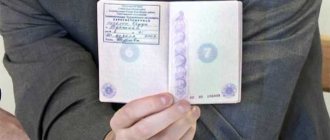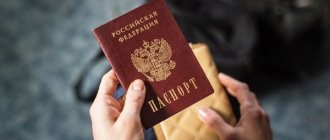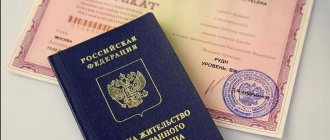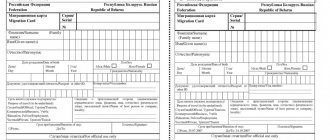Registration and registration - a fundamental difference
The word “propiska” itself is used only in everyday life; it has been firmly established in the colloquial language since the times of the Soviet Union, when registration was a mandatory condition for a citizen to live in a certain territory. But from a legal point of view, at the moment such a concept no longer exists.
Conclusion of the Committee of Constitutional Supervision of the USSR dated October 26, 1990 No. 11 (2-1) “On legislation on issues of registration of citizens” and then Conclusion of the Committee of Constitutional Supervision of the USSR dated October 11, 1991 No. 26 (2-1) “On the licensing procedure registration of citizens”, it was recognized that the provisions on registration, obliging citizens to obtain permission from internal affairs bodies or other government bodies to reside in all settlements on the territory of the USSR, limit the right of citizens to freedom of movement and freedom to choose their place of residence.
Registration in Russia was formally abolished on October 1, 1993
since the entry into force of the Law of the Russian Federation of June 25, 1993 No. 5242-1 “On the right of citizens of the Russian Federation to freedom of movement, choice of place of stay and residence within the Russian Federation.” Nowadays registration does not officially exist in Russia; it has been replaced by the concept of registration.
At the same time, as the legislator justifies, these institutions have a fundamental difference: registration was a kind of permission to reside in a certain territory, while registration is of a notification nature
.
At the same time, in essence, registration is the responsibility of a citizen, and not his right, since the law states that citizens of the Russian Federation are required to register at their place of stay and place of residence within the Russian Federation within the time limits established by law.
Fulfillment of this obligation is ensured, not least by administrative measures.
, living at the place of residence and at the place of stay without registration may entail the imposition of an administrative fine on citizens in the amount of two thousand to three thousand rubles; for tenants, owners of residential premises (individuals) - from two thousand to five thousand rubles; for legal entities - from two hundred and fifty thousand to seven hundred and fifty thousand rubles.
What happens if you live without registration?
Based on Article 19.15.1 of the Code of Administrative Offenses of the Russian Federation, administrative liability for violation of registration rules is provided in the form of penalties.
Citizens who failed to comply with registration rules are required to pay a fine in the amount of 2 thousand to 3 thousand rubles. Those who provided their housing will be forced to lose from 2 thousand to 5 thousand rubles from their budget. For Moscow and St. Petersburg, the fine is slightly higher - 3-5 thousand rubles and 5-7 thousand rubles, respectively.
There are exceptions - moments when lack of registration is not considered a violation of the law:
- living in the living space of close relatives;
- if you have permanent residence in the same locality.
It is possible to challenge the sanctions imposed on a citizen if there is a compelling justification for violating the registration deadline (for example, a serious illness or injury that makes the person temporarily incapacitated).
A citizen cannot stay in the country without any type of registration at all. In its absence, a person will not be able to take advantage of benefits, receive social benefits, enroll in an educational institution, etc. This is illegal.
Types of registration
In accordance with Art. 2 of the Law of the Russian Federation of June 25, 1993 No. 5242-1 “On the right of citizens of the Russian Federation to freedom of movement, choice of place of stay and residence within the Russian Federation”, registration is of two types: permanent
(at the place of residence) and
temporary
(at the place of stay).
Main difference
of these types of registrations is that permanent registration is valid indefinitely until the person himself wishes to be deregistered due to relocation or other reasons. The permanent registration stamp is placed in the passport. A citizen can also be discharged by court decision, for example, if a person is declared missing.
Temporary registration is being processed
if a person is not at his place of residence for more than 90 days. Registration at the place of residence is issued for a certain period - from 90 days to five years.
How to legally stay at your place of residence?
When a person moves to another city for permanent residence, he will need permanent registration. To receive it, you need to submit the following documents to the migration service:
- Statement.
- Passports (of the applicant and the owner of the apartment).
- Title documents and permits from all apartment owners.
Additionally, you may need a departure sheet, a military ID and a marriage certificate.
Registration will be completed within 7 days. In some cases, the period may be extended to 14 days.
Why is registration required?
The Constitutional Court of the Russian Federation has repeatedly indicated in its decisions that the mere fact of registration or lack thereof does not give rise to any rights or obligations for a citizen
and cannot serve as a basis for restricting the rights and freedoms of a citizen. Registration, in the sense in which it does not contradict the Constitution of the Russian Federation, is only a way of recording citizens within the Russian Federation, which is of a notification nature and reflects the fact that a citizen is at his place of residence or place of stay.
However, under the current registration rules, the lack of registration significantly complicates the life of citizens, since, first of all, the presence of registration is beneficial to the citizen himself. To apply for a pension, social benefits, register a car or other transactions
Registration at the place of residence (stay) in a specific locality is required.
There have also been numerous incidents related to the difficulties of children enrolling in schools and kindergartens, being assigned to a clinic, and so on. Citizens cannot confirm the status of a young family and the need for a housing subsidy if they are not registered in the same region.
In addition, without a registration stamp
, most likely, it will not be possible to conclude an agreement, since few people will dare to enter into an agreement with a person without a fixed place of residence. There are even cases of refusal to register a marriage due to the lack of registration of one of the future spouses, both permanent and temporary.
Duration of residence without registration
How long can you live without registration and is it possible to live without registration in Russia?
The legislation of the Russian Federation determines the time frame provided for registration. Administrative liability is provided for failure to comply with the time periods for registration.
In particular, the regulating act of registration at the place of residence (stay or permanent residence) is Government Decree No. 713 on the Rules for registration and deregistration at a permanent or temporary address.
If a citizen intends to temporarily stay in a certain territory (stay), then the state allows not to register with the Federal Migration Service for up to 90 days. In this case, a temporary registration is issued, which should be applied for no later than 3 months. After this period of time, permanent registration must be carried out.
If a citizen intends to reside permanently in a particular locality, then the registration procedure at a permanent place of residence should be carried out. Clause 16 of the Decree of the Government of the Russian Federation of July 17, 1995 No. 713 establishes 1 week for a person to register at a permanent place of residence.
Violation of this legal act entails administrative liability in the form of a fine of 2 to 3 thousand rubles.
- in passport
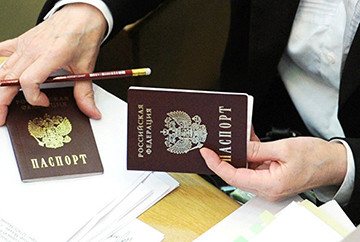
If a person does not have a permanent place of residence and is staying in the city temporarily, then he is issued a certificate.
The passport must be stamped within 8 working days.
The passport is left at the organization conducting the registration. Instead, a temporary identification document is provided.
- after the sale of the apartment
In the case of selling an apartment, moving to a new place of residence should take no more than a week according to the law.
The law also states that a person is allowed to register with relatives on a temporary basis before purchasing a new living space. To do this, you must submit an application to the Federal Migration Service.
- after discharge
Many people believe that the 7-day period specified for registration begins to count from the moment of check-out from the previous living space.
However, this is incorrect, since the law clearly stipulates that a citizen who has changed his permanent place of residence must be registered within a week from the moment of arrival at the new one.
This means that the application must be submitted within a week of arriving at the new address.
The following documentation may serve as evidence confirming the existence of new housing:
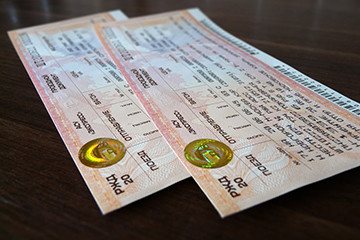
- Train, plane, bus passes.
- A document establishing ownership of new real estate (as a rule, this is an agreement that specifies the date on which rights to the property arise; 7 days begin counting from this date).
- Residential rental agreement.
- in another city
Registration in another city can be temporary or permanent.
When registering, you must comply with the deadlines, otherwise administrative liability may arise in the form of a fine:
- Permanent registration requires, in addition to an application, a document granting the right to registration and a passport. They may also require confirmation of your stay - travel tickets and coupons are provided.
- Temporary stay without registration in another city is allowed for no more than 3 months. After this, you need to submit an application to the FMS.
- at the place of residence
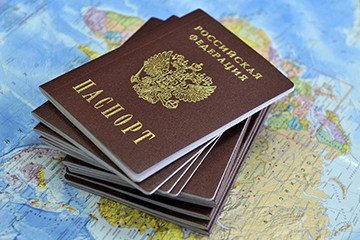
There are times when it is impossible to give a clear answer to the question of how long you can live without registration.
For some categories of citizens, the time for registration is different.
For example:
- Citizens of the Russian Federation - 7 days from the moment of moving to a new home (permanent registration), 90 days from the moment of the start of stay (temporary registration).
- Foreign citizens – 7 days from the date of receipt of a visa document or residence permit (permanent registration), 7 days (temporary registration).
- Newborns – 7 days after the issuance of a birth certificate or initial registration (permanent registration), 90 days (temporary registration).
What to do if there is no registration?
In the absence of permanent registration, you can apply for a temporary
. This will require the consent of the owner of the property in which the citizen intends to “register”.
To register at your place of stay you will need:
- identification document;
- application for registration at the place of stay (the form is filled out at a personal appointment);
- a document that is the basis for temporary residence at the specified address (this may be a rental agreement, social lease, sublease of housing; an application from the person providing housing, or another document);
Submit documents for registration
At your place of residence you can:
- online, through the portal of government services of the Russian Federation;
- in the area where the housing is located;
- at the management company of your home, if it provides passport office services.
Temporary registration is issued
, in addition, in a hotel, sanatorium, holiday home, boarding house, campsite, medical organization, tourist center or other similar institution.
Registration periods for permanent and temporary residence

The deadline for registration at the permanent residence address and the residence address differ. If you do not meet the deadlines, there is a high probability of receiving a fine.
However, it seems difficult to prove that the terms of residence have been violated.
Only temporary registration can be done for a certain time. The registration certificate indicates the time for which temporary registration was granted.
Permanent registration is issued on an indefinite basis.
How long can you live without registration?
In accordance with clause 5 of the Law of the Russian Federation of June 25, 1993 No. 5242-1 “On the right of citizens of the Russian Federation to freedom of movement, choice of place of stay and residence within the Russian Federation,” registration of a citizen of the Russian Federation at the place of residence is carried out within a period not exceeding 90 days from the date of arrival of the citizen in the residential premises
.
A citizen of the Russian Federation who has changed his place of residence is obliged no later than seven days from the date of arrival at his new place of residence
contact the person responsible for receiving and transmitting documents to the registration authorities for registration and deregistration of citizens of the Russian Federation at the place of stay and at the place of residence within the Russian Federation.
That is, if a person is deregistered at his place of residence
, he is obliged to contact the accounting authorities within 7 days to deregister and subsequently register at a new location.
If a citizen does not change his permanent registration, but simply arrived in a region different from his place of permanent registration, then he is obliged to register at his place of residence within 90 days.
Individual cases
In certain cases, there are other deadlines that must be met when registering.
Sale/purchase of an apartment
If a person sells his apartment or buys another home, then he needs to submit documents in a week to obtain permanent registration in a new place. But if the deregistration occurs without the opportunity to register at another address on a permanent basis, then the citizen still has 3 months to obtain a temporary registration.
What is your registration?
Registration at the place of residenceRegistration at the place of stay
The citizen must be discharged from the apartment being sold before signing the sales contract. Then a package of documents is submitted for registration of a new registration.
Registration of a newborn and older child
To register a newly born child, you must have a birth certificate. The baby's parents are required to complete this document within 30 days from the birth of the baby (Federal Law No. 143-FZ, Art. 16, Clause 6). Having this document in hand, the baby is permanently or temporarily registered, and in the territory where one of his parents is registered (Civil Code of the Russian Federation, Art. 20).
There are no exact deadlines for registering a newborn at the place of residence, but in any case, after 90 days, the baby must have at least a temporary registration.
Minor children, like adults, must obtain permanent registration within 7 days, temporary - 90 days from the date of settlement. It is easier to register a minor, since the consent of the homeowners is not required if the parent is already registered in the home (RF Government Decree No. 713, section II, clause 12).
Interesting article: The cost of temporary registration in Moscow, St. Petersburg and the regions
In another region
If a person does not live at the registration address, it is necessary to obtain temporary or permanent registration in a new place. The registration deadlines are similar to those generally accepted in the country.
How can it even happen that a person does not have registration?
If a person does not have a current mark in his passport indicating his place of residence
, his relationship with government mechanisms in some situations becomes significantly more complicated, and in others it stops altogether.
There are actually quite a lot of reasons why a person may be left without registration. A person may voluntarily de-register with the intention of registering elsewhere. However, for some reason (for example, family reasons), I was unable to register at the new place.
Various fraudulent schemes are also rumored
, as a result of which a citizen may lose not only registration, but also his apartment.
Apartments of lonely and elderly people are traditional targets for attackers. The scammers’ scheme of action is usually as follows: elderly and lonely people are taken into confidence and, at the right moment, are asked to sign legal papers that are passed off as an “employment contract” or “an application for humanitarian assistance.” After which the victim ends up on the street or in a nursing home.
Or, for example, another case. A citizen bought an apartment and registered at his place of residence
. However, after some time it turned out that the seller of the apartment was a mentally ill person. Such a deal can be challenged in court, for example, by his heirs. And as a result, a citizen may find himself on the street without an apartment or registration.
Legislation on registration
The nuances of the registration procedure and the requirements for persons undergoing it are established in a number of legislative acts:
- The Civil Code establishes the requirement to register at the place of residence.
- Administrative Code - punishment for violating registration deadlines.
- The Housing Code determines the standards for residence and registration in real estate.
- The Family Code defines the rights of children, their living conditions and the obligations of their parents and guardians to ensure these conditions.
- Federal Law No. 5242-1 establishes the registration procedure.
- Government Decree No. 713 of 1995 answers the question of how long you can live without registration.
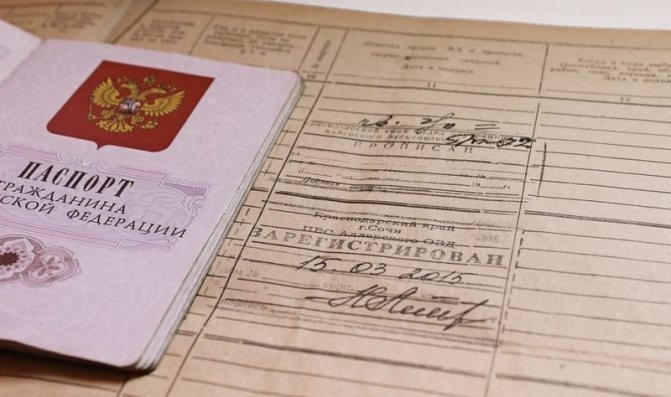
All these documents form the general legal requirements for registration on the territory of the Russian Federation.
Ban me from credit
RBC was the first to tell about this really very good news. And now the appearance of such a document has begun to be discussed not only by journalists, but also by financiers. We are talking about the so-called voluntary ban on credit. That is, if the bill is approved, a person will have the right to refuse to receive any loans.
Why is the appearance of such a document very timely?
Let's show it with a simple example. Olga, a resident of the capital, had financial affairs, as she was sure, in perfect order - no debts, no loans. But a little over a month ago, the woman received “news” from a certain collection agency in the south of the country. A company that collects debts from citizens told Olga that it has a dozen and a half loans that it took out, but is in no hurry to repay. Therefore, financial institutions sold her debts to collectors.
Over the next few weeks, the Muscovite, and then the editorial staff of RG, tried to figure out the loans - “where the legs grow from.” It turned out that this is what happened. All loans on behalf of the Muscovite were taken in a distant polar city, and almost on the same day. The current victim once lived in this city, but a very long time ago. And in the same city she once changed her passport, which was necessary due to her age. The woman changed her passport as expected - at the relevant internal affairs service.
So, all the loans were taken out precisely using the old passport that was taken from the woman and given to her with a new one in return. For 10 years after leaving for the capital, Olga never returned to this northern city. But here’s what we also learned - it seems very likely that the polar financial firms that issued loans using this passport still knew about the scam.
The following circumstance led us to this idea. Having issued loans, various financial organizations located in the same city almost simultaneously and very quickly - literally within a couple of weeks - sold these loans to a collection organization on the other side of the country.
It is very likely that the financial firms that issued loans using the old passport knew about the scam and quickly sold these “debts” to collectors
That is, no one waited for the loans to be repaid, no one bothered to contact the “borrower,” who was not even a debtor at the time the loans were sold.
While dealing with this deception, the editors found out that today the fraudulent scheme through which Olga suffered is one of the most common.
The fraudulent scheme from which Olga suffered developed relatively recently - as soon as our banks began issuing online loans. It is known that to receive them, it is enough to fill out the appropriate application on the bank’s website indicating a minimum set of personal data and the account number where to transfer the money.
RG experts discuss the legal aspects of lending in the “Legal Consultation” section
The scammers immediately appreciated the ease of obtaining such money. It seems that almost earlier than respectable citizens did. The fact is that today it’s easier than ever to get a primitive set of personal data.
For an ordinary person, receiving such a fake loan in his name from a bank, about which he knows nothing, results in a series of very difficult procedures. This includes filing an application with law enforcement agencies, filing a lawsuit in an attempt to contest a loan that was not taken out.
And all this requires from the citizen not only nerves, but also time. And also money. Lawyers explain that now there is a virtual stalemate in which overcoming all of the listed barriers is simply unrealistic for an ordinary citizen. Unless the police will most likely accept statements from deceived citizens. But things will not go further than this. And so far there is not a single fact of catching such credit fraudsters. It is also impossible to prove in court that a person did not take out a loan from a bank. Not a single expert interviewed by the editors could remember the victory of a deceived citizen in such a process during all the years of prosperity of credit fraud.
According to the bill, which seems to be going to be considered this session, any citizen will have the right to introduce and cancel the possibility of issuing any credits or loans in his name.
It is also very convenient that he himself can submit an application for a ban on issuing a loan to a citizen through the State portal. “It seems that such a measure should apply to all clients of banks and microfinance organizations,” the Bank of Russia told RG. “Technologically, a number of banks have already implemented such functionality.”
There really is a problem. It is known that the All-Russian Popular Front has already approached the Bank of Russia with a proposal to legally oblige banks to provide pensioners with the service of voluntary refusal of outgoing online transfers and payments. The Bank of Russia then responded that, in their opinion, such an initiative should apply to all clients, and not just people over 60 years old.
As noted by the Bank of Russia, voluntary restriction of a number of transactions is effective in cases where a client of a financial organization is provoked to remotely perform actions with his accounts in favor of attackers, as well as in the case of online loans issued by attackers using the client’s personal data.
Can a foreigner do business in Russia?
Russia welcomes foreign investment, so not only Russians, but also citizens of other countries can do business in our country. Moreover, to open a company, business owners do not even have to come to the Russian Federation, much less live here. Everything can be done through representatives.
But if a foreign citizen wants to register an individual entrepreneur, then to do this he needs to legally reside in Russia, having issued a temporary residence permit or residence permit. Similar requirements apply for registering an NAP payer.
Therefore, to the question whether a foreign citizen can become self-employed, the answer is yes. Of course, if he has a temporary residence permit or residence permit on the territory of the Russian Federation.
But unlike registration of individual entrepreneurs, self-employed status can so far only be obtained by citizens of states that are members of the Eurasian Economic Union. And these are Belarus, Kazakhstan, Armenia, the Kyrgyz Republic.
For example, a citizen of Ukraine or Uzbekistan will not be able to become self-employed, even if he has a temporary residence permit or residence permit in Russia. Such persons will only be able to register an individual entrepreneur or LLC.
However, the issue of expanding the list of countries whose citizens will be able to switch to the NAP was raised at the end of 2021. Therefore, other CIS countries can join the EAEU member countries at any time. You can track this information according to the law of November 27, 2018 N 422-FZ.
